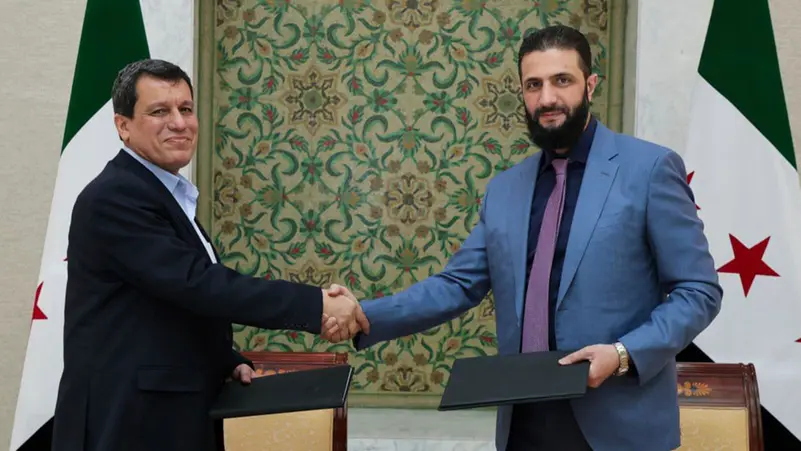Kurdish military commander Mazloum Abdi met with Syrian President Ahmed al-Sharaa in Damascus Wednesday, joined by US and French envoys, to discuss implementing the March integration agreement between Syria’s autonomous Kurdish administration and the central government amid ongoing disputes over decentralization demands.
High-Level Diplomatic Talks Resume Integration Efforts
A high-level delegation from the Syrian Democratic Forces (SDF) and the Autonomous Administration of North and East Syria arrived in Damascus Wednesday for crucial talks with Syrian President Ahmad al-Sharaa. The meeting, supervised by US envoy Thomas Barrack and French chargé d’affaires Jean-Baptiste Faivre, brought together key figures including SDF Commander Mazloum Abdi and senior Kurdish representatives Ilham Ahmed, Fouza Youssef, and Abdul Hamid al-Mahbash.
The discussions focused on implementing the March 10 agreement signed between Abdi and al-Sharaa, which established a framework for cooperation during Syria’s transitional phase. However, progress has been hampered by fundamental disagreements over governance structures. The Kurds, who control vast territories in northern Syria including significant oil and gas fields, continue to demand a decentralized administrative system that Damascus has consistently rejected.
Thomas Barrack, serving as both US ambassador to Turkey and special envoy for Syria, played a central role in facilitating the talks. The diplomatic engagement represents President Trump’s administration’s continued involvement in Syrian affairs, with discussions expected to address potential amendments to the original agreement’s timeline and specific Kurdish demands.
March Agreement Framework Under Review
The March 10 agreement contains several significant provisions aimed at unifying civilian and military institutions of the Autonomous Administration with those of the Syrian government. The deal encompasses critical infrastructure including border crossings, airports, and energy resources, while affirming that the Kurdish people constitute “an inseparable part of Syria” with guaranteed constitutional rights.
Political sources indicate that while the core framework remains intact, some clauses may be subject to amendments at the SDF’s request, coordinated with Washington. France has expressed support for the agreement and communicated its position to the United States, demonstrating broader international backing for the integration process.
The agreement also includes provisions for enhanced security coordination with the international coalition against ISIS, reflecting the SDF’s continued role in security operations. The US-backed SDF, which spearheaded the offensive that led to ISIS’s territorial defeat in Syria, maintains control over large areas in northern and eastern Syria.
Regional Implications and Future Challenges
The integration talks carry significant implications for Syria’s post-conflict reconstruction. President al-Sharaa, whose forces led the offensive that toppled former leader Bashar al-Assad after more than 13 years of civil war, has called for the dissolution of all militant groups in Syria. This position creates tension with Kurdish demands for maintaining autonomous security structures.
In previous statements, Abdi emphasized the need for a “decentralized Syria where all its components live with their full rights,” directly challenging Damascus’s vision of centralized governance. Syrian Foreign Minister Asaad al-Shaibani has warned that delaying integration could “open the door to foreign interference and fuel separatist tendencies.”
The current round of talks builds on previous diplomatic efforts, including a June 1 meeting between AANES delegates and Syrian transitional government officials. The SDF announced the formation of a negotiation committee in April to represent northeastern Syria in discussions with Damascus.
The outcome of these negotiations will significantly impact Syria’s political future, determining whether the country can achieve sustainable peace through accommodation of Kurdish aspirations or face continued fragmentation along ethnic and regional lines. The presence of US and French envoys underscores international commitment to facilitating a negotiated settlement that preserves Syria’s territorial integrity while addressing minority rights concerns.


